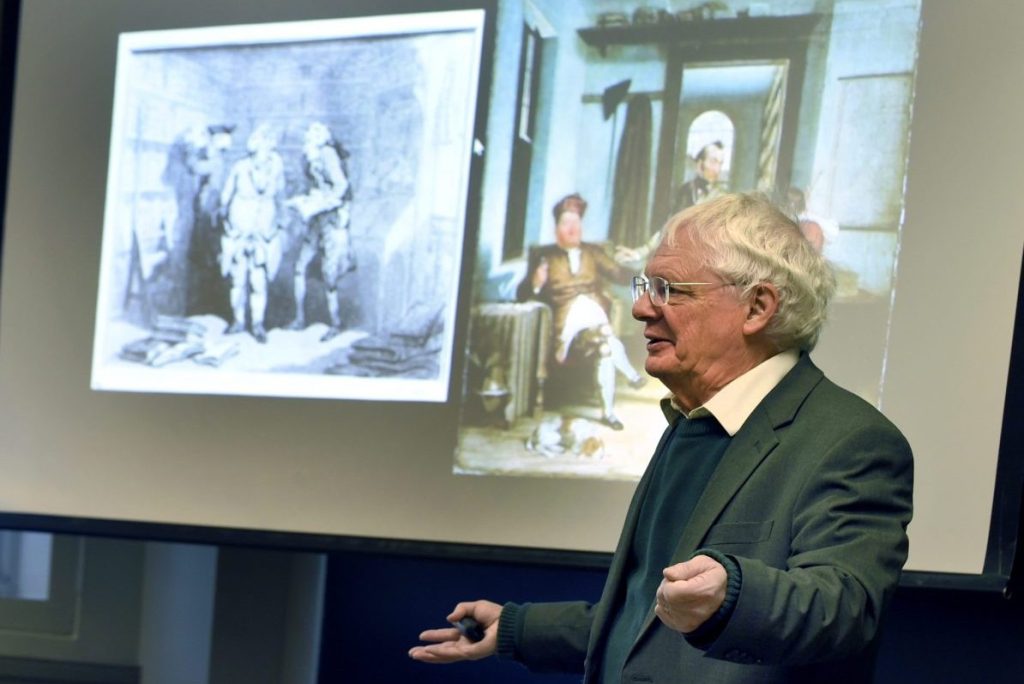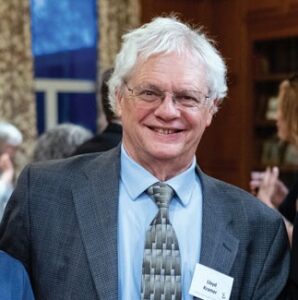Often attributed to Mark Twain — perhaps mistakenly, since no historical source shows he actually made the statement — “History doesn’t repeat itself, but it often rhymes” is a common and apt refrain when discussing the connection between historical perspectives and current events. By drawing on knowledge of what happened in the past, and why, we are better able to understand the flow and direction of the history collectively created in each new day.
“Past Rhymes With Present Times” is a new series by Lloyd S. Kramer exploring historical context and frameworks, and how the foundations of the past affect the building of the future.

Lloyd Kramer, photo via Donn Young/UNC College of Arts and Sciences
I taught history for almost forty years at the University of North Carolina in Chapel Hill. My courses often examined the political ideas, institutions, and conflicts that created and sustained democracies from ancient times down to the modern era; and although student engagement with historical issues changed over the decades, young people almost always wanted to join classroom discussions about the strengths and flaws of democratic governments.
This historical work grew out of my own education in American schools and universities, where the teachers and students generally assumed that the United States was on a long trajectory toward more inclusive participation in democratic political life.
The Progress of Democracy
Democratic aspirations have never been completely realized, of course, but most Americans of my generation believed that democratic political ideals and constant political struggles had gradually pushed American institutions to accept the inclusion of women, immigrants, religious communities, and racial groups whose equal human rights and freedoms were denied in earlier historical eras.
We also assumed that most Americans believed in the reasonable foundations of a democratic society: the value of public education, the importance of debates and well-informed reporting in a free press, the pragmatic tolerance for diverse religious beliefs, political ideas, and social customs, the need for legal equality and an independent judicial system, the commitment to nonpartisan military forces, the progress of scientific and humanistic knowledge within universities, and the freedom of speech that ensures ongoing public debates, protests and access to government institutions.
For many now-despairing Americans, however, this familiar, progressive narrative about democratic institutions and political rights cannot explain why people across the globe have turned toward authoritarian leaders, why Trumpism has become so popular across the United States, or why legislatures in multicultural states such as North Carolina have fallen under the control of ideological policymakers from one political party. Democratic aspirations have by no means disappeared, but the advocates for democratic processes and traditions seem to be swimming against a global political tide that is drowning democratic ideals and lifting strongmen on ever-higher waves of authoritarian power.
Why, then, do so many people fear that the once-reasonable foundations of democratic systems have lost credibility or relevance? Why do self-referential religious, racial, cultural, ethnic, or national identities evoke more political passion than more abstract beliefs in democracy, tolerance, and human equality? Is the long-celebrated era of the “Democratic Revolutions,” which began in late 18th-century America, coming to a 21st-century demise amid the complexities of vast, multicultural states and the global surge of multiracial immigrations? These are questions that challenge our faith in democracy and also call for our broadest historical perspectives.
Jeffersonian Education in an Age of Fear-Driven Emotions and Social Media
America’s early advocates for democratic institutions assumed that education would provide the essential foundation for self-government. As Thomas Jefferson argued in a Virginia Bill for the “More General Diffusion of Knowledge” (1778), history had long shown how “those entrusted with power have… perverted it into tyranny,” which meant that the citizens in a free society must be carefully educated “to know ambition under all its shapes… and to exert their natural powers to defeat its purposes.”
Jefferson has been rightly condemned for his actions as a racist enslaver, but his argument for the links between education, knowledge, and democracy transcended his personal flaws and shaped enduring American beliefs in the political power of well-educated citizens. As he noted in one of his later letters, “the qualifications for self-government in society… are the result of habit and long training.”
This Jeffersonian confidence in the rational “training” for democratic life has gradually collapsed in modern communities that emphasize personal identities, economic self-interest, polarized political affiliations, and simplistic messages on social media rather than the value of participation in government institutions. Widespread complaints about both the real-world corruption of political ideals and the self-interested character of political leaders have discredited earlier hopes for the fact-based deliberations that the nation’s founders envisioned for America’s public leaders and the nation’s teachers wanted to foster in America’s public schools.
There has never been a “golden age” of reasonable political debate in American society (or elsewhere), but we’re now living with postmodern anxieties that flow from a diminishing confidence in the value of reason-based expertise, the relevance of carefully collected factual knowledge, and the need for an independent, free press. Education systems that emerged with 18th-century aspirations for the development of human rationality are facing crises that confound or demoralize teachers and students in almost every kind of academic institution.
This declining confidence in schools, in universities, and in the free press, however, reconfirms our need for historical knowledge, which was an essential component of the Jeffersonian belief in democratic education. In periods of deep uncertainty about our present-day institutions and political future, we need to understand why past democracies have flourished or collapsed.
Current challenges seem exceptional and paralyzing until we examine how people waged the American Revolution, destroyed slavery in the Civil War, secured voting rights for women, defeated dictators in Europe, and advanced the Civil Rights movement against the authoritarian system of Jim Crow racism. Nobody who participated in these struggles could really see or fully understand how their obscure personal actions helped to strengthen democracy or expand human rights because history is always contingent and evolving.
Anyone who wants to promote democratic rights, equality, and freedom in our own time must therefore take their next historical steps against anti-democratic ideologies and power-hungry strongmen with a forward-looking belief in the open-ended development of all conflicts and historical transitions. The future can never be known, but we can be certain that it will differ from what now exists, and that modern, democratic societies cannot flourish without vibrant, well-supported public schools

Photo via Lindsay Metivier
Lloyd Kramer is a professor emeritus of History at UNC, Chapel Hill, who believes the humanities provide essential knowledge for both personal and public lives. He has recently published “Traveling to Unknown Places: Nineteenth-Century Journeys Toward French and American Selfhood,” but his historical interest in cross-cultural exchanges also shaped earlier books such as “Nationalism In Europe and America: Politics, Cultures, and Identities Since 1775” and “Lafayette in Two Worlds: Public Cultures and Personal Identities in an Age of Revolutions.”

